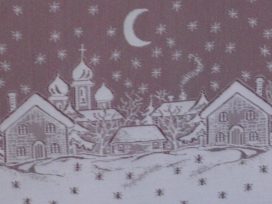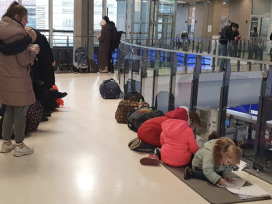
A leading Ukrainian-American writer on grace, justice, power and freedom.
The fact that Slavenka Drakulic has agitated the local public, proves only that the conspiracy of silence is widely accepted, writes translator and essayist Mirjana Miocinovic, defending Drakulic against her critics.
How can an article that is almost a confession, written in a melancholy tone of voice, in which sorrow and joy are intertwined, an article in which there exists remorse for harm done to the other, in which the author sees herself not as someone who proclaims the “last truth”, nor as someone who considers her “interpretation of the truth” to be “the only possible, genuine and just” one, but demands only that the truth be found, that the truth be faced, believing only in its sobering effect, as she once believed, despite the personal consequences, when telling the incontestable truth about “her environment” – how can such an article provoke that amount of fury, that amount of cynicism, such a torrent of sickly sweet pathos, all trying to “defend our cause”.
I see reasons for such reactions in our perception of the “others”, who are not allowed to see us as we are, but only as we want to be. And we are, according to the tiny mirror in which we look at ourselves, “a dignified and creative nation, proud of its history” (the last two decades are part of that history too, whether we like it or not, ergo we should be proud of them too), we are blessed with (blessed by God of course) “great sensibility for the arts”. We are blessed with a sensibility for beauty, freedom and truth, we have a subtle “feeling for sorrow, for pleasure” (to which Bora Stankovic1 bears witness, and which, in the nature of things, holds good for ever), we ache and suffer because of our identity (which means that we are an unprecedented anthropologic phenomenon, an exception which does not prove any rule), because we want to be our “own master”, to be free to decide upon our “destiny”, and instead are surrounded by a “lazy crowd”, by slaves, who have no “divine sparkle”, and who, therefore, need no freedom. To have the courage not only to tell such people (in a floating pub or at a private party for example) but to publish in a Viennese magazine, that “the Serbs live in denial of their recent past” and that “there seems to be no desire in (Serbian) society to find out the truth” (written in italics so that the emphasis cannot be lessened by the discreet doubt implied by the word seem) – that is too blasphemous, is “untrue” and therefore “doesn’t deserve many words being wasted on it”.
Despite everything, many words were used in order to stuff the other’s mouth with dirty rags, to let them know that we decide who may write “politically coloured articles” and which colour can be used, that we regulate genre and the levels of “ideology and politics”.
To me it doesn’t seem, rather I know and declare – even if the “young lions” say I am a “do-gooder”, because history teaches them rightly that they can be very dangerous creatures – that we live in denial of our past (if we know our past, because without knowing it we cannot deny it) and that there is “no desire to find out the truth” (if we are young enough), because the truth is binding, it keeps us awake at night, it destroys illusions. Denying the truth we erase traces of it, refusing to let it become public, we keep the serene feeling of “innocence”, the right to make wrong conclusions, to give wrong answers to questions asked. For example: “Why were we bombed in the heart of Europe?” This is not a metaphysical question (despite its self-pitying context), and we cannot “meditate” while answering it. It is actually very, very much of this world, and can be answered precisely, without ambiguity, if only we don’t deny what preceded that year (1999), everything that happened in the course of ten years in the “heart of Europe”, primarily thanks to us.
And this is what happened. We, “brothers and sisters”, were the first to throw flowers on tanks, the same tanks that were fencing off and clearing space just for us (because being happy meant then, and not only then, living in a homogenous paradise). We were the first after the Second World War to build concentration camps (Omarska, Keraterm – “death loves pretty names”, the poet Miodrag Stanisavljevic would later say). Our band of soldiers kept Sarajevo under siege three-and-a-half-years, in this “heart of Europe”, so that both beardless children and obscure “friends of the Serbian nation”, authors who had similar talent and who shared the same beliefs with the leader of that very same Serbian nation (the names are not mentioned because Slavenka Drakulic considers them odious), can learn how to shoot a sniper rifle on the firing range of the “heart of Europe”. Our priests blessed the murderers before their raids against the others. We killed 8000 people in only three days “in the heart of Europe”, and then moved their bodies from one mass grave to another in order to cover our tracks (and for that hard work many, many Serbs are needed, no matter how diligent). We have, with our God-given sensibility for “sorrow and pleasure”, raped hundreds of the other’s women. We have banished 800 000 others from “the holy Serbian land of Kosovo”, killed entire families, and transported their bodies in refrigerated lorries, then dumped them into rivers and lakes, which we today call “tourist pearls”. And we want to deny all that and protect our children from truth, so that they can, living in a world submerged in lies, end up in Obraz, Narodni stroj, Dveri,2 so that they can wear t-shirts with pictures of war criminals and, in spite of their “sensibility for beauty”, not be bothered by their swelled faces, their troubled ugliness. To deny and protect so that vengeful annoyance can burst out of their feeling of being “undeservedly” cheated of their right, an annoyance that doesn’t choose the object on which it vents its anger, always failing to hit the real perpetrators.
The fact that Slavenka Drakulic has agitated the local public, proves only that the conspiracy of silence is widely accepted, that many, both the literate and those who think they are literate, are ready to sharpen their pens, and like first-graders cover the troublesome parts of our history with ink spots (this time without being punished).
Maybe one day a young person looking at the amiable facade that covers the truth of the last twenty years of our history will write: “You whitewashed the walls to no purpose!” Maybe it will be the daughter of Danica Vucenic. Therefore a “Hello!” to both her and her mother.
Published 3 April 2009
Original in Serbian
Translated by
Alma Memic-Avdic
First published by Politika 14 March 2009 (Serbian version)
© Mirjana Miocinovic / Eurozine
PDF/PRINTSubscribe to know what’s worth thinking about.

A leading Ukrainian-American writer on grace, justice, power and freedom.

Remaining in a new country or returning home? The Knowledgeable Youth podcast delves into the complex decision-making refugees face when migrating, together with researcher Olena Yermakova.